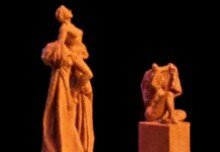On ‘It Seems to Me’
Similar in feeling to ‘Odysseus’, this poem makes a direct personal assertion of the speaker’s disillusion and of his incapacity – perhaps even unwillingness – to cope with violent change.
The imagery [of ‘It Seems to Me’] suggests the ruined remains from a remote age. The speaker himself is, anachronistically enough, “guarding” a city long dead, or so “it seems”. The many lights he now observes are weak, dispersed reflections of a single source that has ceased to exist – such as the light of a long-vanished star that shines down to us through space. Thus, the comparatively narrow time-span in which social and cultural changes occurred (“years” rather than “ages”) has been metamorphosed into the immensity of “light years”.
A feeling of emptiness attaches itself even to those things that “disintegrating time” has not affected. These things (dvarim is an unspecific, even blurred category) are “abandoned” by time and the speaker also passes them by. They come back to him devoid of any urgency of action; they live without time. They live a slow existence alongside ashtrays and cups of coffee growing cold, petty, everyday objects that are all the witnesses that remain to the memory of a great past.
But there is nothing here of revolt. Indeed, the speaker can actually enjoy “the benefit of the doubt”. The legal phrase makes it clear that his status and his rights are undecided, as though he had been acquitted through lack of evidence. But the phrase may also be understood as the speaker’s own enjoyment of a doubtful situation, in which he is under no compulsion to make decisions or to take any other action – he is free simply to walk around a great deal and to do a lot of guessing . . . perhaps at the same time wondering – as Gouri remarks elsewhere in the same volume from which our poem comes (Windrose, 1960) – “What, in fact, had we wanted to say?/ Where and when did the error begin?”
The final line of the poem repeats the first two lines, compressing them into one but significantly omitting the qualification: “It seems to me”. Thus there remains only one certainty: that the speaker is a guardian of the dead past – not only of his own but also of the dead past of a once-living society, of an entire “city” which has crumbled to pieces. Anachronistic and superfluous though he be, nevertheless he guards the walls that remain.
The almost pained contrast between a once-thriving “walled city” – the biblical overtones are inescapable – with the pettiness of modern “ashtrays” is a familiar phenomenon in Gouri’s poetry. Often the effect is achieved stylistically by the opposition of biblical rhetoric to colloquial directness, as for example, in the line from an untitled poem in the same volume . . . “Behold the days shall come of that’s that”.
From the point of view of poetic form, ‘It Seems to Me’ gives an impression of looseness. As opposed to the conventional structures in Gouri’s first volume, looseness of pattern is frequently found in his later writing, and there is also a pronounced tendency toward simplicity and colloquialism in the choice of words and phrases. In ‘It Seems to Me’ an almost hidden, sporadic rime (nim) links several of the stanzas or sections. Although upon closer analysis an iambic pattern can be discerned, the effect of a regular meter is quite lacking because of the great variations in line length (from 1 to 9 iambic feet) and of the tired “crumbling” tone.
From The Modern Hebrew Poem Itself: a New and Updated Edition. Edited by Stanley Burnshaw, T. Carmi, Susan Glassman, Ariel Hirschfeld and Ezra Spicehandler. Detroit: Wayne State University Press, 2003, 162-163








